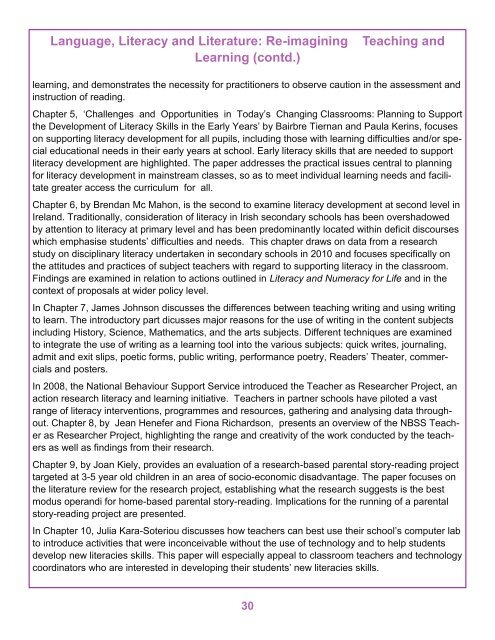LITERACY NEWS
LAI Newsletter 20_05_2015
LAI Newsletter 20_05_2015
- No tags were found...
Create successful ePaper yourself
Turn your PDF publications into a flip-book with our unique Google optimized e-Paper software.
Language, Literacy and Literature: Re-imaginingLearning (contd.)Teaching andlearning, and demonstrates the necessity for practitioners to observe caution in the assessment andinstruction of reading.Chapter 5, ‘Challenges and Opportunities in Today’s Changing Classrooms: Planning to Supportthe Development of Literacy Skills in the Early Years’ by Bairbre Tiernan and Paula Kerins, focuseson supporting literacy development for all pupils, including those with learning difficulties and/or specialeducational needs in their early years at school. Early literacy skills that are needed to supportliteracy development are highlighted. The paper addresses the practical issues central to planningfor literacy development in mainstream classes, so as to meet individual learning needs and facilitategreater access the curriculum for all.Chapter 6, by Brendan Mc Mahon, is the second to examine literacy development at second level inIreland. Traditionally, consideration of literacy in Irish secondary schools has been overshadowedby attention to literacy at primary level and has been predominantly located within deficit discourseswhich emphasise students’ difficulties and needs. This chapter draws on data from a researchstudy on disciplinary literacy undertaken in secondary schools in 2010 and focuses specifically onthe attitudes and practices of subject teachers with regard to supporting literacy in the classroom.Findings are examined in relation to actions outlined in Literacy and Numeracy for Life and in thecontext of proposals at wider policy level.In Chapter 7, James Johnson discusses the differences between teaching writing and using writingto learn. The introductory part dicusses major reasons for the use of writing in the content subjectsincluding History, Science, Mathematics, and the arts subjects. Different techniques are examinedto integrate the use of writing as a learning tool into the various subjects: quick writes, journaling,admit and exit slips, poetic forms, public writing, performance poetry, Readers’ Theater, commercialsand posters.In 2008, the National Behaviour Support Service introduced the Teacher as Researcher Project, anaction research literacy and learning initiative. Teachers in partner schools have piloted a vastrange of literacy interventions, programmes and resources, gathering and analysing data throughout.Chapter 8, by Jean Henefer and Fiona Richardson, presents an overview of the NBSS Teacheras Researcher Project, highlighting the range and creativity of the work conducted by the teachersas well as findings from their research.Chapter 9, by Joan Kiely, provides an evaluation of a research-based parental story-reading projecttargeted at 3-5 year old children in an area of socio-economic disadvantage. The paper focuses onthe literature review for the research project, establishing what the research suggests is the bestmodus operandi for home-based parental story-reading. Implications for the running of a parentalstory-reading project are presented.In Chapter 10, Julia Kara-Soteriou discusses how teachers can best use their school’s computer labto introduce activities that were inconceivable without the use of technology and to help studentsdevelop new literacies skills. This paper will especially appeal to classroom teachers and technologycoordinators who are interested in developing their students’ new literacies skills.30


